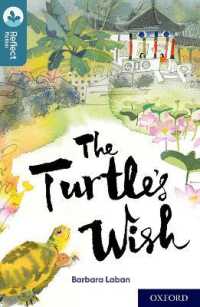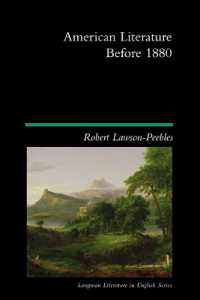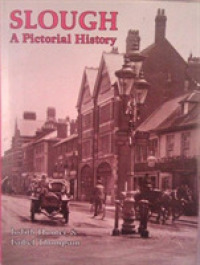Full Description
The Routledge Handbook of Chicana/o Studies is a unique interdisciplinary resource for students, libraries, and researchers interested in the largest and most rapidly growing racial-ethnic community in the United States and elsewhere which can either be identified as Chicano, Latino, Hispanic, or Mexican-American. Structured around seven comprehensive themes, the volume is for students of American studies, the Social Sciences, and the Humanities. The volume is organized around seven critical domains in Chicana/o Studies:
Chicana/o History and Social Movements
Borderlands, Global Migrations, Employment, and Citizenship
Cultural Production in Global and Local Settings
Chicana/o Identities
Schooling, Language, and Literacy
Violence, Resistance, and Empowerment
International Perspectives
The Handbook will stress the importance of the historical origins of the Chicana/o Studies field. Starting from myth of origins, Aztlán, alleged cradle of the Chicana/o people lately substantiated by the findings of archaeology and anthropology, over Spanish/Indigenous relations until the present time. Essays will explore cultural and linguistic hybridism and showcase artistic practices (visual arts, music, and dance) through popular (folklore) or high culture achievements (museums, installations) highlighting the growth of a critical perspective grounded on key theoretical formulations including borderlands theories, intersectionalities, critical race theory, and cultural analysis.
Contents
Introduction: Handbook of Chicana/o Studies, Francisco A. Lomelí, Denise A. Segura and Elyette Benjamin-Labarthe Part I. Chicana/o History and Social Movements Introduction to Chicana/o History and Social Movements 1. What is Aztlán?: Homeland, Quest, Female Place, David Carrasco 2. Chicano History- A General Approach, Mario T. García 3. Recent Chicana/o Historiography: Advances, Shortcoming, and Challenges, Alex M. Saragoza 4. The Chicano Movement, Ramón A. Gutiérrez 5. A Genealogy of Chicana History, the Chicana Movement, and Chicana Studies, Miroslava Chávez-García 6. Bilingual Education: History, Policy, and Insights from Critical Race Theory, Grace P. McField Part II. Borderlands: Contested (Im)migrations, Culture and Citizenship Introduction to Borderlands: Contested (Im)migrations, Culture and Citizenship 7. México y lo Mexicano in Aztlán: Transborder Economic, Cultural and Political Links, David R. Maciel and María Rosa García-Acevedo 8. Immigration, Latinos, and the Media, Leo R. Chávez 9. Mobilizing for Life: Illegality, Organ Transplants, and Migrant Biosociality, Jonathan Xavier Inda 10. Discourses of Violence and Peace: About and On the U.S.-Mexico Border, María-Socorro Tabuenca 11. Reconstructing Home in the Borderlands, Patricia Zavella Part III.Cultural Production in Local and Global Settings Introduction to Cultural Production in Local and Global Settings 12. Colonial, De-colonial, and Transnational Choreographies in Ritual Danzas and Popular Bailes of Greater Mexico, Enrique R. Lamadrid 13







